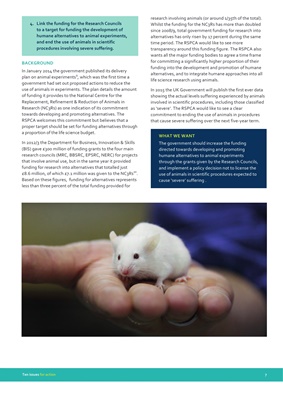
7
Ten issues for action
4. Link the funding for the Research Councils
to a target for funding the development of
humane alternatives to animal experiments,
and end the use of animals in scientific
procedures involving severe suffering.
BACKGROUND
In January 2014 the government published its delivery
plan on animal experiments9
, which was the first time a
government had set out proposed actions to reduce the
use of animals in experiments. The plan details the amount
of funding it provides to the National Centre for the
Replacement, Refinement & Reduction of Animals in
Research (NC3Rs) as one indication of its commitment
towards developing and promoting alternatives. The
RSPCA welcomes this commitment but believes that a
proper target should be set for funding alternatives through
a proportion of the life science budget.
In 2012/3 the Department for Business, Innovation & Skills
(BIS) gave £300 million of funding grants to the four main
research councils (MRC, BBSRC, EPSRC, NERC) for projects
that involve animal use, but in the same year it provided
funding for research into alternatives that totalled just
£8.6 million, of which £7.1 million was given to the NC3Rs10.
Based on these figures, funding for alternatives represents
less than three percent of the total funding provided for
WHAT WE WANT
The government should increase the funding
directed towards developing and promoting
humane alternatives to animal experiments
through the grants given by the Research Councils,
and implement a policy decision not to license the
use of animals in scientific procedures expected to
cause 'severe' suffering .
research involving animals (or around 1/35th of the total).
Whilst the funding for the NC3Rs has more than doubled
since 2008/9, total government funding for research into
alternatives has only risen by 17 percent during the same
time period. The RSPCA would like to see more
transparency around this funding figure. The RSPCA also
wants all the major funding bodies to agree a time frame
for committing a significantly higher proportion of their
funding into the development and promotion of humane
alternatives, and to integrate humane approaches into all
life science research using animals.
In 2015 the UK Government will publish the first ever data
showing the actual levels suffering experienced by animals
involved in scientific procedures, including those classified
as 'severe'. The RSPCA would like to see a clear
commitment to ending the use of animals in procedures
that cause severe suffering over the next five-year term.